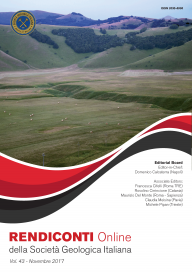
Cultural climate in Naples between the birth and development of volcanology
Elena Cubellis (a), Giuseppe Luongo (a,b,c) & Francesco Obrizzo (a)
(a) Istituto Nazionale di Geofisica e Vulcanologia, Sezione di Napoli - Osservatorio Vesuviano, Via Diocleziano 328, 80124, Napoli, Italy.
(b) Università di Napoli "Federico II", Corso Umberto I, Napoli.
(c) Accademia delle Scienze Fisiche e Matematiche in Napoli, Via Mezzocannone 8, Napoli.
Corresponding author e-mail: elena.cubellis@ingv.it
DOI: https://doi.org/10.3301/ROL.2017.36
Volume: 43/2017
Pages: 64-78
Abstract
With the Industrial Revolution the laws of physics were introduced to explain natural phenomena. At that time the Vesuvian Observatory emerged as the first volcanological observatory in the world to monitor the activity of Vesuvius on a permanent basis. Naples became an attractor for scholars, who were to analyze volcanic phenomena by developing relationships between the science of laws and those of processes. After World War I interest in Naples-based volcanology further increases, as attested by the founding in the city of Immanuel Friedlaender's International Institute of Volcanology. Following the twenty-year Fascist period, Italy had two objectives: to reconstruct the network of science laboratories and rebuild the approach to studying Earth Sciences through comparison with more advanced countries. Significant and original contributions were made regarding the new theory of global tectonics and the mitigation of natural risks.
Keywords
Get Full Text